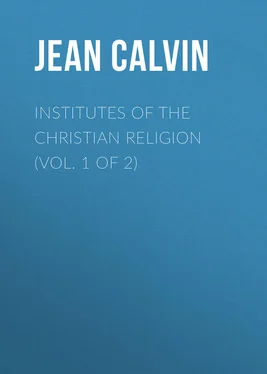Jean Calvin - Institutes of the Christian Religion (Vol. 1 of 2)
Здесь есть возможность читать онлайн «Jean Calvin - Institutes of the Christian Religion (Vol. 1 of 2)» — ознакомительный отрывок электронной книги совершенно бесплатно, а после прочтения отрывка купить полную версию. В некоторых случаях можно слушать аудио, скачать через торрент в формате fb2 и присутствует краткое содержание. Жанр: foreign_antique, foreign_prose, на английском языке. Описание произведения, (предисловие) а так же отзывы посетителей доступны на портале библиотеки ЛибКат.
- Название:Institutes of the Christian Religion (Vol. 1 of 2)
- Автор:
- Жанр:
- Год:неизвестен
- ISBN:нет данных
- Рейтинг книги:3 / 5. Голосов: 1
-
Избранное:Добавить в избранное
- Отзывы:
-
Ваша оценка:
- 60
- 1
- 2
- 3
- 4
- 5
Institutes of the Christian Religion (Vol. 1 of 2): краткое содержание, описание и аннотация
Предлагаем к чтению аннотацию, описание, краткое содержание или предисловие (зависит от того, что написал сам автор книги «Institutes of the Christian Religion (Vol. 1 of 2)»). Если вы не нашли необходимую информацию о книге — напишите в комментариях, мы постараемся отыскать её.
Institutes of the Christian Religion (Vol. 1 of 2) — читать онлайн ознакомительный отрывок
Ниже представлен текст книги, разбитый по страницам. Система сохранения места последней прочитанной страницы, позволяет с удобством читать онлайн бесплатно книгу «Institutes of the Christian Religion (Vol. 1 of 2)», без необходимости каждый раз заново искать на чём Вы остановились. Поставьте закладку, и сможете в любой момент перейти на страницу, на которой закончили чтение.
Интервал:
Закладка:
After the greater part of the work had been translated, he had the happiness to meet with an edition in French of which he has availed himself in translating the remainder, and in the revision of what he had translated before. Every person, who understands any two languages, will be aware that the ambiguity of one will sometimes be explained by the precision of another; and, notwithstanding the acknowledged superiority of the Latin to the French in most of the qualities which constitute the excellence of a language, the case of the article is not the only one in which Calvin's French elucidates his Latin.
The scriptural quotations which occur in the work, the Translator has given, generally, in the words of our common English version; sometimes according to the readings in the margin of that version; and, in a few instances, he has literally translated the version adopted by the Author, where the context required his peculiar reading to be preserved. Almost all the writers of that age, writing chiefly in a dead language, were accustomed to speak of their adversaries in language which the polished manners of the modern times have discarded, and which would now be deemed illiberal and scurrilous. Where these cases occur, the Translator has not thought himself bound to a literal rendering of every word, or at liberty to refine them entirely away, but has adopted such expressions as he apprehends will give a faithful representation of the spirit of the Author to modern readers.
Intending this work as a complete system of theology, the Author has made it the repository of his sentiments on all points of faith and practice. The whole being distributed into four parts, in conformity to the Apostles' Creed, and this plan being very different from that of most other bodies of divinity, the Translator has borrowed from the Latin edition of Amsterdam a very perspicuous general syllabus, which will give the reader a clear view of the original design and plan of the treatise.
He would not be understood to represent these Institutes as a perfect summary of Christian doctrines and morals, or to profess an unqualified approbation of all the sentiments they contain. This is a homage to which no uninspired writings can ever be entitled. But the simplicity of the method; the freedom from the barbarous terms, captious questions, minute distinctions, and intricate subtilties of many other Divines; the clearness and closeness of argument; the complete refutation of the advocates of the Romish Church, sometimes by obvious conclusions from their professed principles, sometimes by clear proofs of the absurdities they involve; the intimate knowledge of ecclesiastical history; the intimate acquaintance with former theological controversies; the perspicuity of scriptural interpretation; and the uniform spirit of genuine piety, which pervade the book, cannot escape the observation of any judicious reader.
It has been advised by some persons that the translation should be accompanied by a few notes, to elucidate and enforce some passages, and to correct others; but, on all the consideration which the Translator has been able to give to this subject, he has thought it would be best to content himself with the humble office of placing the sentiments of Calvin before the reader, with all the fidelity in his power, without any addition or limitation. He hopes that the present publication will serve the cause of true religion, and that the reputation of the work itself will sustain no diminution from the form in which it now appears.
London, May 12, 1813 .
The Author's Preface to An Edition Published In The Year 1559, With His Last Corrections And Additions
In the first edition of this work, not expecting that success which the Lord, in his infinite goodness, hath given, I handled the subject for the most part in a superficial manner, as is usual in small treatises. But when I understood that it had obtained from almost all pious persons such a favourable acceptance as I never could have presumed to wish, much less to hope; while I was conscious of receiving far more attention than I had deserved, I thought it would evince great ingratitude, if I did not endeavour at least, according to my humble ability, to make some suitable return for the attentions paid to me – attentions of themselves calculated to stimulate my industry. Nor did I attempt this only in the second edition; but in every succeeding one the work has been improved by some further enlargements. But though I repented not the labour then devoted to it, yet I never satisfied myself, till it was arranged in the order in which it is now published; and I trust I have here presented to my readers what their judgments will unite in approving. Of my diligent application to the accomplishment of this service for the Church of God, I can produce abundant proof. For, last winter, when I thought that a quartan ague would speedily terminate in my death, the more my disorder increased, the less I spared myself, till I had finished this book, to leave it behind me, as some grateful return to such kind solicitations of the religious public. Indeed, I would rather it had been done sooner; but it is soon enough, if well enough. I shall think it has appeared at the proper time, when I shall find it to have been more beneficial than before to the Church of God. This is my only wish.
I should indeed be ill requited for my labour, if I did not content myself with the approbation of God alone, despising equally the foolish and perverse judgments of ignorant men, and the calumnies and detractions of the wicked. For though God hath wholly devoted my mind to study the enlargement of his kingdom, and the promotion of general usefulness; and I have the testimony of my own conscience, of angels, and of God himself, that, since I undertook the office of a teacher in the Church, I have had no other object in view than to profit the Church by maintaining the pure doctrine of godliness; yet I suppose there is no man more slandered or calumniated than myself. When this Preface was actually in the press, I had certain information, that at Augsburg, where the States of the Empire were assembled, a report had been circulated of my defection to popery, and received with unbecoming eagerness in the courts of the princes. This is the gratitude of those who cannot be unacquainted with the numerous proofs of my constancy, which not only refute such a foul calumny, but, with all equitable and humane judges, ought to preserve me from it. But the devil, with all his host, is deceived, if he think to overwhelm me with vile falsehoods, or to render me more timid, indolent, or dilatory, by such indignities. For I trust that God, in his infinite goodness, will enable me to persevere with patient constancy in the career of his holy calling; of which I afford my pious readers a fresh proof in this edition.
Now, my design in this work has been to prepare and qualify students of theology for the reading of the divine word, that they may have an easy introduction to it, and be enabled to proceed in it without any obstruction. For I think I have given such a comprehensive summary, and orderly arrangement of all the branches of religion, that, with proper attention, no person will find any difficulty in determining what ought to be the principal objects of his research in the Scripture, and to what end he ought to refer any thing it contains. This way, therefore, being prepared, if I should hereafter publish any expositions of the Scripture, I shall have no need to introduce long discussions respecting doctrines, or digressions on common topics, and therefore shall always compress them within a narrow compass. This will relieve the pious reader from great trouble and tediousness, provided he come previously furnished with the necessary information, by a knowledge of the present work. But as the reason of this design is very evident in my numerous Commentaries, I would rather have it known from the fact itself, than from my declaration.
Читать дальшеИнтервал:
Закладка:
Похожие книги на «Institutes of the Christian Religion (Vol. 1 of 2)»
Представляем Вашему вниманию похожие книги на «Institutes of the Christian Religion (Vol. 1 of 2)» списком для выбора. Мы отобрали схожую по названию и смыслу литературу в надежде предоставить читателям больше вариантов отыскать новые, интересные, ещё непрочитанные произведения.
Обсуждение, отзывы о книге «Institutes of the Christian Religion (Vol. 1 of 2)» и просто собственные мнения читателей. Оставьте ваши комментарии, напишите, что Вы думаете о произведении, его смысле или главных героях. Укажите что конкретно понравилось, а что нет, и почему Вы так считаете.












